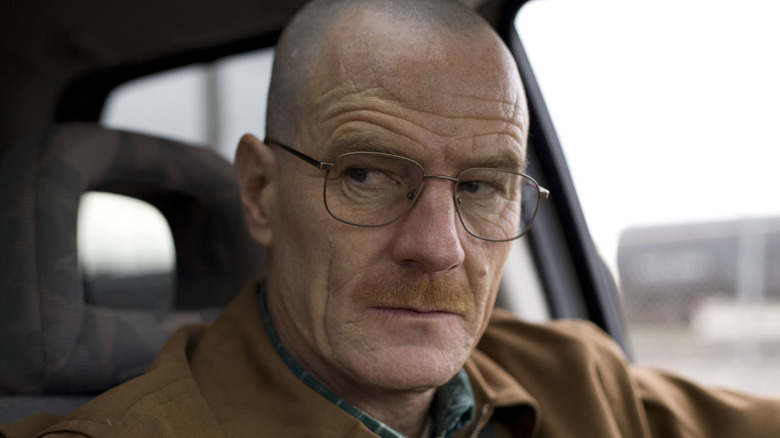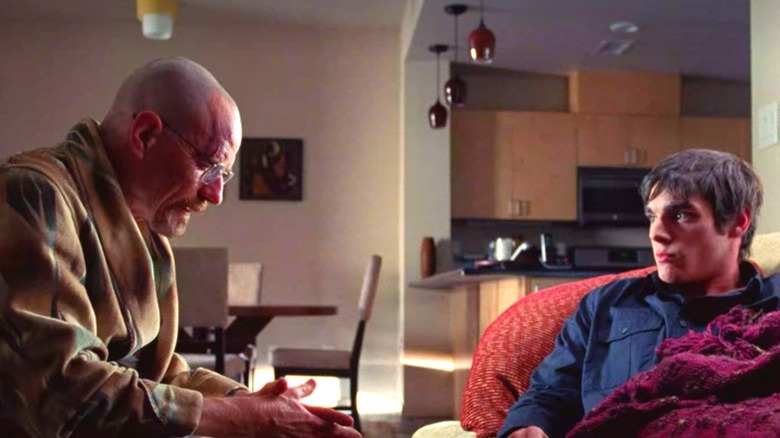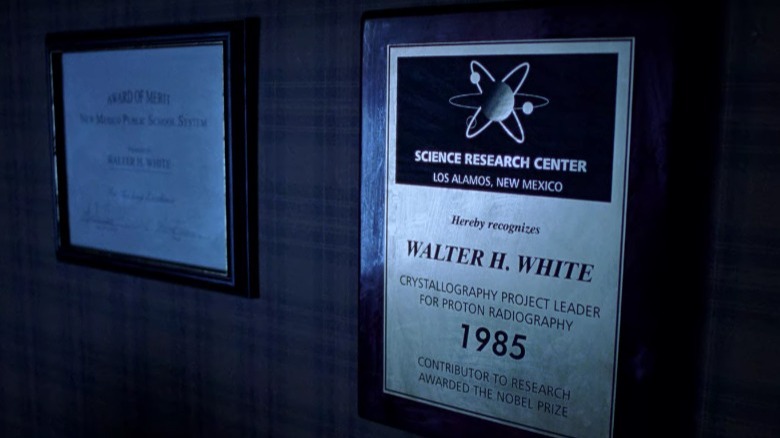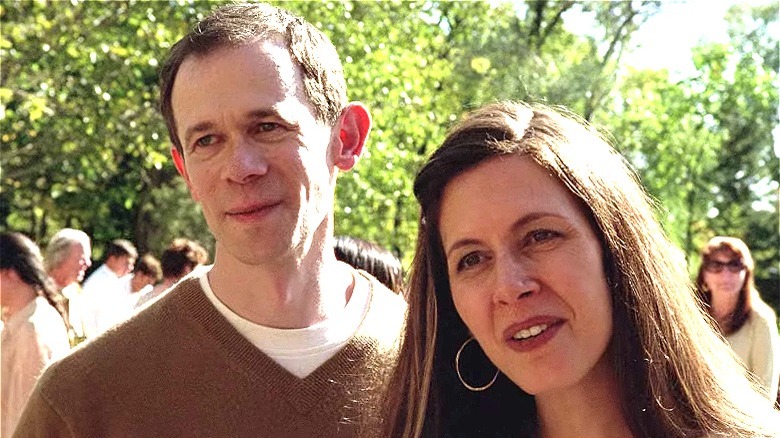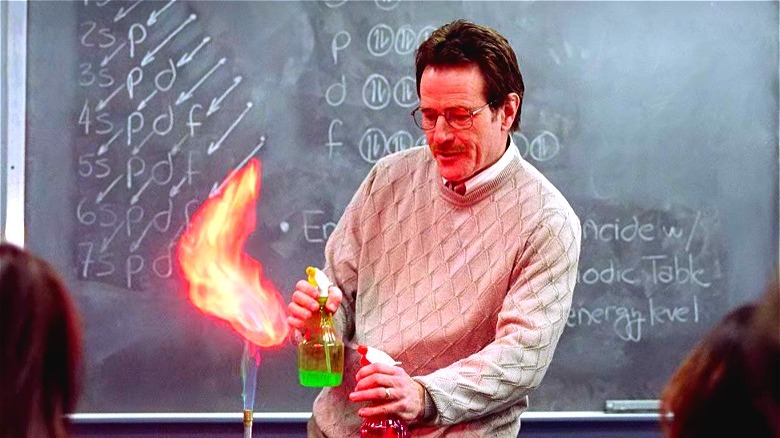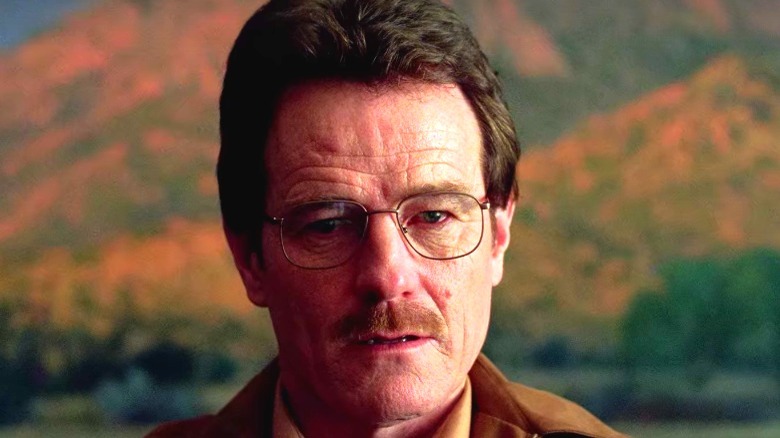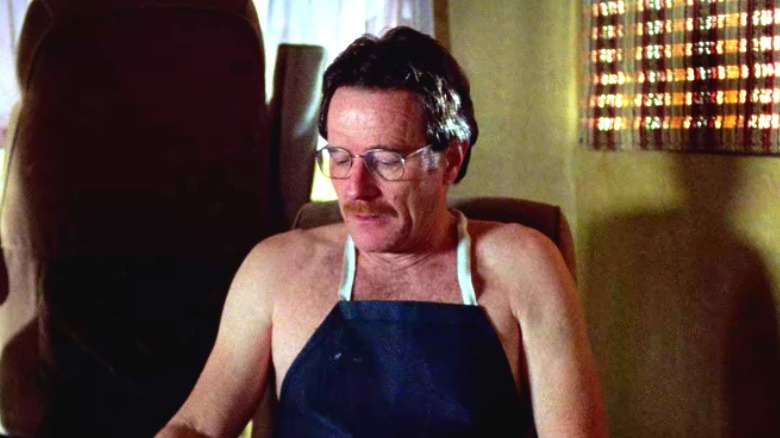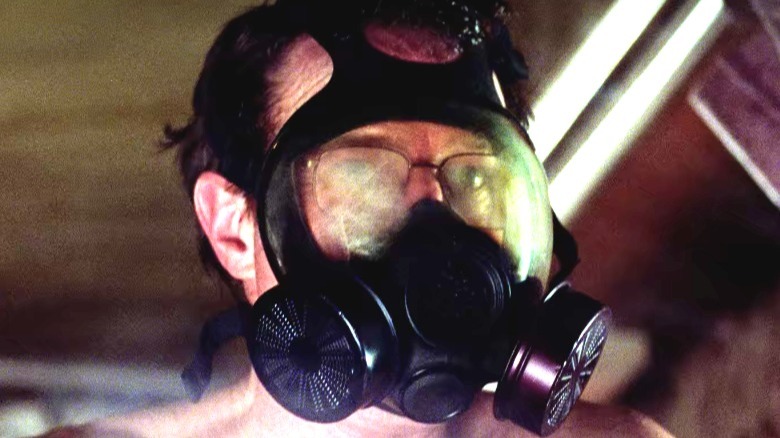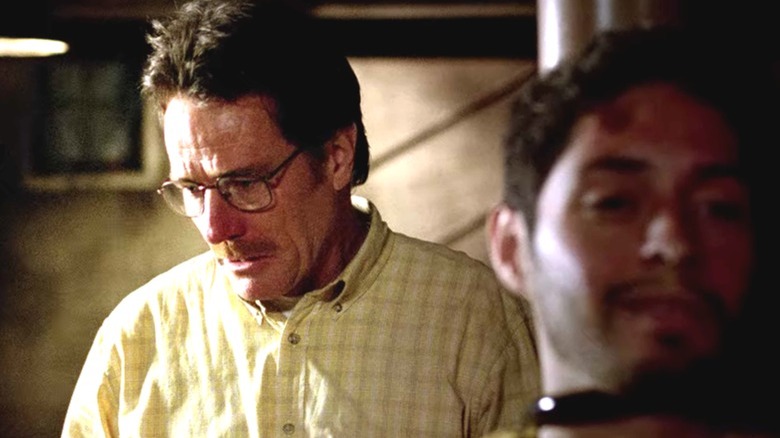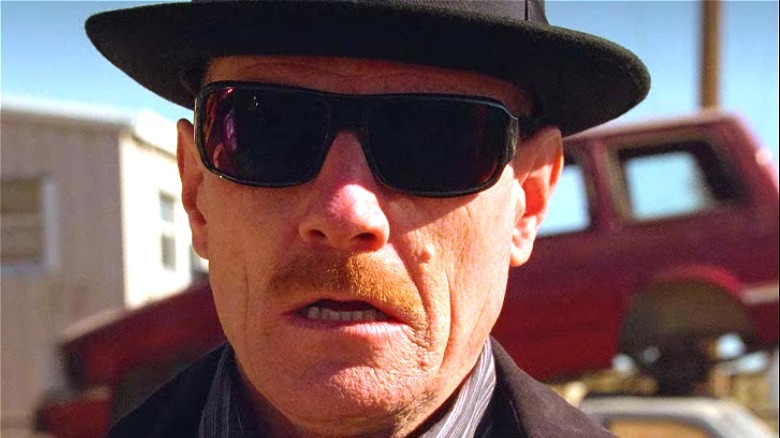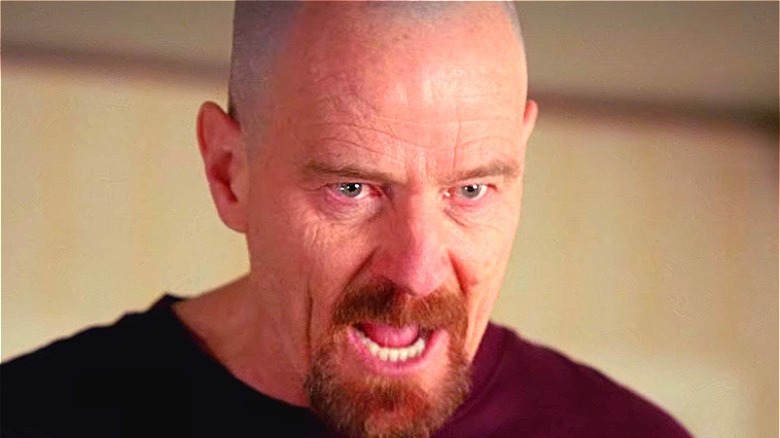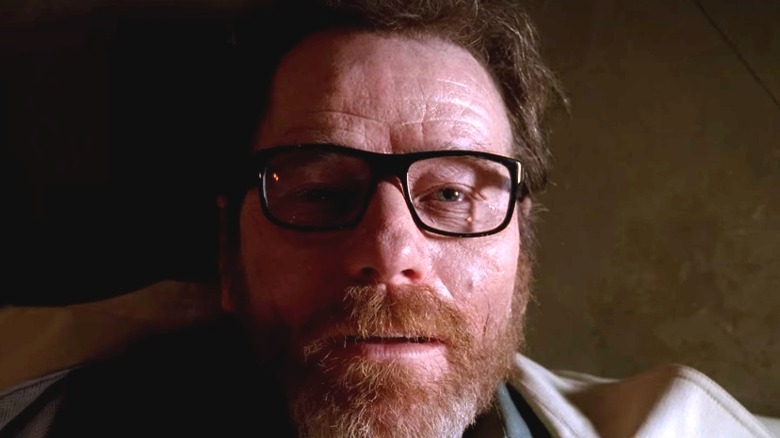Breaking Down Walter White's Transformation From Breaking Bad Pilot To Finale
Our cultural fascination with organized crime has led to the creation of iconic, larger-than-life figures like Don Corleone and Tony Montana. Even the most complex anti-heroes like Tony Soprano tend to be bold, colorful, and glamorous in their own way. When the criminal element is painted in such bold lines, even when we relate to some of their motives, it's easy to dismiss their actions as something only the most extreme offenders would engage in.
By imagining what it would take for a normcore middle-aged husband and father to devolve into a drug manufacturer and cold-blooded killer, "Breaking Bad" forced viewers to confront a frightening reality — that maybe evil isn't a monolithic force that's diametrically opposed to good, but the gradual culmination of a series of justifications enlisted by everyday people. Perhaps it's that journey that we find so fascinating as Walter White's transformation into his worst self gives audiences a glimpse into the consequences of one man's untethered free will. Hang onto your pork pie hat as we break down exactly what it takes for someone to go from science teacher to ricin-killing meth man — at least in the world of "Breaking Bad."
Frightened child
When we first meet Walter White in the pilot episode, it's hard to believe a mild-mannered chemistry teacher, devoted husband, and loving father to a disabled child could even consider taking a walk on the dark side. While Walt's health condition is the primary incentive in his decision to break bad, it's later revealed that his own back story as a child also helped mold him into the person he is at the beginning of the series.
Control — particularly the kind that comes from projecting traditionally masculine strength — is one of Walt's key motivators, so it makes sense when we learn about the trauma and sense of helplessness he experienced as a child. Growing up in the 1960s, Walt never had a strong father figure because his father had been sick and suffering for as long as he could remember. As he would eventually tell his son Walt Jr., Walt's father was diagnosed with Huntington's disease when Walt was only four or five years old. His only memory of his father was of a hospital visit during his father's final days, a frightening memory of hospital smells and the sight of his father "all twisted up" and possibly unable to recognize his own son. For Walt, this memory would eventually come to define how he felt he should project himself to his own son, telling Walt Jr. of his own illness in Season 4's "Salud," "I don't want that to be the memory you have of me when I'm gone."
Promising young chemist
With his lifelong love of science, young Walter White seems destined for greatness during his college years. While a grad student at the California Institute of Technology (Caltech) where he studies X-ray crystallography, Walt forms a close friendship with fellow scientist Elliott Schwartz. Together, they form the company Gray Matter Technologies — a name inspired by combining their surnames as Schwartz is German for "black," which combined with Walt's "white" makes gray. As the company is taking off, the young chemists file for several patents and continue to engage in scientific research. Walt's work as crystallography project leader for a photon radiography project at Los Alamos would even contribute to Nobel Prize-winning chemistry research in 1985, something he is still hanging onto decades later — as seen in the series pilot.
Although "Breaking Bad" never explicitly outlines the types of patents or work Gray Matter Technologies is preoccupied with during Walt's time with the startup, a few clues can be found hidden in a Scientific American cover and article framed on Elliott's wall. Listed under "Breakthroughs," the article reads, "Gray Matter Technologies closes in on the molecular switch." A molecular switch is a nanoscale-level device that turns on and off like a light switch, something that holds tremendous implications for the future of medicine. Walt's eventual fall from someone who could help humanity to a man who relishes manufacturing a deadly drug as part of the organized crime world further emphasizes the depravity and corruption of his spirit.
Insecure sellout
Walter White's transformation from mild-mannered science guy to Machiavellian meth manufacturer might at first look like a fall from grace. But a closer look reveals he's been repressing his Dark Triad traits since long before cooking up that first batch of crystal, something his former partners Elliot and Gretchen try and eventually fail to overlook. Like many narcissists, Walt has a way of maintaining relationships without revealing the true darkness and toxicity of his inner nature, traits that only emerge when he feels threatened, competitive, or not fully in control. A hint of this inner darkness is first revealed in Walt's relationship with his Gray Matter colleagues, foreshadowing the Shakespearean downfall to come.
As a young scientist, Walt is set on a course most could only dream of as his business begins to take off and he becomes engaged to his lab assistant, Gretchen. But after meeting her wealthy family, Walt abruptly breaks things off, selling his share of the company for a measly $5000. As show creator Vince Gilligan told Huffington Post, Gretchen's wealth "kind of blew his mind and made him feel inferior and he overreacted. He just kind of checked out." As the story is told from Walt's perspective, it can seem like Elliott and Gretchen cut him out of the company, profiting from his ideas and leaving poor Walt out to dry. It's an idea that Walt is happy to perpetuate, so much so that Saul Goodman in "Better Call Saul" suggests Walt sue the pair for patent fraud, intellectual property theft, and wrongful termination.
Underpaid family man
An early example of Walt's tendency to varnish history in a way that erases any shade of responsibility for his own actions, his impulsive departure from Gray Matter would forever change the path of his life while brewing resentment over his relationship with Elliott and Gretchen. After Walt's departure, the company soared in value, eventually becoming a multi-billion dollar corporation by the time we're introduced to Walt. To add insult to injury, Elliott and Gretchen become an item in his absence.
Whether it's because he's too preoccupied with coveting his neighbor or he truly was the weakest link in Gray Matter, Walt's former colleagues prosper while his own life shifts into neutral. For a while, he continues working in research, taking jobs at a handful of chemical labs through the years as seen in Season 1's "Cancer Man". When Walt's crossword puzzle-sparked romance with restaurant hostess Skyler leads to marriage and a kid, he finds himself living what many folks would see as the fulfillment of the American dream — a stable job, a family, and home ownership.
But for Walt's fragile ego, his tepid marriage, middle-class home, and the challenges of raising a son with cerebral palsy never amount to the dream he sold. When he trades in his research career for work as a high school chemistry teacher, moonlighting at a car wash, it's as if he has become resigned to a life of mediocrity and resentment.
Detached death sentence
The nadir of Walter White's life of mediocrity would come with his cancer diagnosis, a growing physical symbol of the decay of his soul that would push him into a life of crime. Walt's life at this point is one of droning monotony, self-condemned to go through life quietly absorbing insults through gritted teeth. The White family's existence is plagued by working-class miseries from overdue bills, broken appliances, and the fact that there's another mouth to feed on the way only adds to the pressure. At one point, Skyler even multitasks their sex life while managing her online sales.
Walt's 50th birthday is a parade of miseries: his son's complaints, his disrespectful students and boss, a party that seems more for Skyler than him where he's upstaged by his brother-in-law's DEA exploits. When Walt receives his terminal diagnosis after passing out at the carwash the day after his party, his blank reaction to the bleak prognosis — a life expectancy of two years, best case scenario — seems a logical extension of the numbness with which he goes through life. But as that information slowly sinks in, it short-circuits the filter holding back Walt's rage and resentment, a side that first emerges when his boss asks him to work late, inciting Walt to shout "F*** you and your eyebrows!"
Startup meth cook
With a looming death sentence and the pressure to leave his family with something to live on hanging over his head, Walt finally begins to snap out of the numb resignation he's been coasting through life on. But it's a meth bust ride-along with his DEA brother-in-law that wakes him up to the possibility of breaking bad, an act of rebellion against both the literal and figurative impotence that have defined his life since foolishly selling his share of Gray Matter.
While this financial pressure and family obligation serve as Walt's official reason for getting into the meth business, they're ultimately his excuse for rejecting the aggressively beige role he has settled into. After all, the genesis of Walt's foray into meth cooking arises before he gets his cancer diagnosis when he sees how much cash Hank seized on a raid in "Pilot." It looks like a quick and easy payday, but before Walt's diagnosis, it was the type of risk-tolerant activity he would never engage in.
The diagnosis liberates Walt, freeing him to embrace his long-repressed darker side. When he realizes his former student Jesse Pinkman is a meth cook, Walt finds himself with both the excuse and the means to get into the meth business, even if he hasn't fully considered all of the implications and risks. After deciding to cook, Walt feels more energized than he has in years, naively telling Jesse he is "awake" and uncharacteristically knocking a teenager down for bullying his son, the first sign that Dark Walt is finally unleashed.
Conflicted killer
The next stage of Walt's transformation is precipitated by external forces, thanks in large part to his own poor judgment. One of the fatal mistakes Walt makes is treating the meth business like gig work he can do for as long — or as short — as he wants. Despite his advanced chemistry knowledge, Walter lacks any real sense of what drug production is like, not the least of which is how to interact with hardened drug dealers. As every character in an organized crime story eventually learns, there's simply no dabbling in the drug business, at least not at any lucrative level.
With his mind set on a quick payday and the thrill of doing something old Walt would never have done, Walt immediately finds himself in over his head, making rookie mistakes that put Jesse and himself in danger. After Jesse invites two dealers out to the middle of nowhere to purchase thousands in meth, Walt is forced to cook at gunpoint. Aware that he will likely be killed after the cook is over, he throws together some fancy chemistry, using deadly phosphine to gas his captors. The homicidal self-defense act that would leave most people sleepless and traumatized seems to ignite Walt's anesthetized libido and empower him, serving as the first of many grim milestones in a long, dark journey.
Cold-blooded killer
Despite Walt's first-kill libido boost in Season 1 episode "...and the Bag's in the River," the distressing events surrounding his first cook at least leave him feeling somewhat troubled. When one of the two assailants he hit with the phosphine gas turns out to still be alive, he and Jesse find themselves saddled with a seriously injured drug dealer who has already threatened to kill them. While they work out what to do and worry about the human corpse rapidly decomposing in the RV, they keep Krazy-8 secured in Jesse's basement — the irony being that at this point they haven't made so much as a dime from selling meth.
They realize quickly that Krazy-8 has to be finished off, but as the newly-minted killer, Walt finds this easier said than done. At one point, he tries to work through his moral conflict by brainstorming the pros and cons of killing the drug dealer. Still not ready to commit cold-blooded murder, Walt is ultimately spared the burden when Krazy-8 tries to kill him once more, spurring Walt to asphyxiate him with the bike lock around his neck. Aware now that there's no going back, the Walt we see moving forward becomes far less conflicted about the ethical implications of his crimes.
Heisenberg
Every crime boss needs a street name. For Walt, that street name becomes something of a sentient alter-ego as he gradually becomes the living embodiment of his pseudonym Heisenberg. It's a name he takes early on in his meth manufacturing career, inspired by the name of theoretical physicist Werner Heisenberg. It's also a name that would eventually become the stuff of legend, ultimately finding its way into the DEA investigation in Season 2's "Breakage." If Walter White is Dr. Jekyll, Heisenberg is his Mr. Hyde.
As Walt continues his descent into moral bankruptcy, his Heisenbergian side gradually takes over, with his actions becoming increasingly more horrific, eventually turning from his more passive or justifiable kills by his own standards to the cold-blooded killings of Gus's foot soldiers, Gale Boetticher, and Gus Fring. By the time the Season 4 finale "Face Off" arrives, where he poisons Brock Cantillo in an effort to turn Jesse against Gus and save his own skin, Walter White is no longer recognizable. Walt has fully morphed into Heisenberg — even if he is still hanging onto the illusion of Walter White, science teacher, and dad.
The one who knocks
Walt's filter is already mostly gone before his cold-blooded killing of Krazy-8. But afterward, his behavior toward Jesse and Skyler becomes unapologetically abusive. For a while, he is able to excuse much of that behavior to his family by scapegoating it onto his cancer diagnosis. But as he gets deeper into the meth business, Walt's actions become increasingly unhinged with things ultimately coming to a head after Skyler learns about his burner phone and money stash in Season 2's "ABQ."
Up until this point, Walt has performed his share of unforgivable acts, not the least of which is allowing Jane to die, an act that would inadvertently lead to the death of two flights full of passengers when her grieving air-traffic controller father makes a fatal mistake. But through it all, he has continued to feign the "nice-guy" persona he once embodied when it suited him, often compartmentalizing the darker aspects of his Jekyll-and-Hyde personality.
In Season 4's "Cornered" Walt finally reveals the truth about his drug manufacturing to Skyler. He stops pretending, initiating a sort of Faustian bargain and a cold war that would last the rest of his marriage. Skyler doesn't fully understand how bad things have gotten until he lays it out for her when she suggests he is in danger. An incensed Walt tells her, "I am not in danger, Skyler. I am the danger. A guy opens his door and gets shot, and you think that of me? No. I am the one who knocks!"
Fallen anti-hero
By the end of "Breaking Bad," Walter White has racked up a direct kill count of dozens either murdered at his behest or by his own hands, so to say he is irredeemable is something of an understatement. While it isn't quite enough to fall under "better late than never," Walt does manage to turn away from the dark side in his final hours on this mortal coil, completing his transformation into a tragic fallen anti-hero.
Like most narcissists, Walt is able to continue justifying his actions throughout the series, even the killing of Mike Ehrmantraut. But getting Hank killed serves as the impetus for a belated wake-up call, marking the turning point of Walt's final transformation, even if it wouldn't be fully realized until the series' penultimate episode "Granite State."
After months on the run, Walt phones Flynn in an effort to arrange a money drop-off that would see Walt's vision finally realized. But struck by Flynn's anger at Hank's death, Walt decides to turn himself into the police, but not before completing some final business. After arranging with Elliott and Gretchen to take care of his family financially, Walt admits his true motivations to Skyler, telling her he selfishly did it because it made him feel alive. As his final act in the series finale "Felina," he kills Lydia with ricin and saves Jesse from the Nazis, finally laying down and dying among the meth lab, freeing the world from the misery he wrought upon it.
